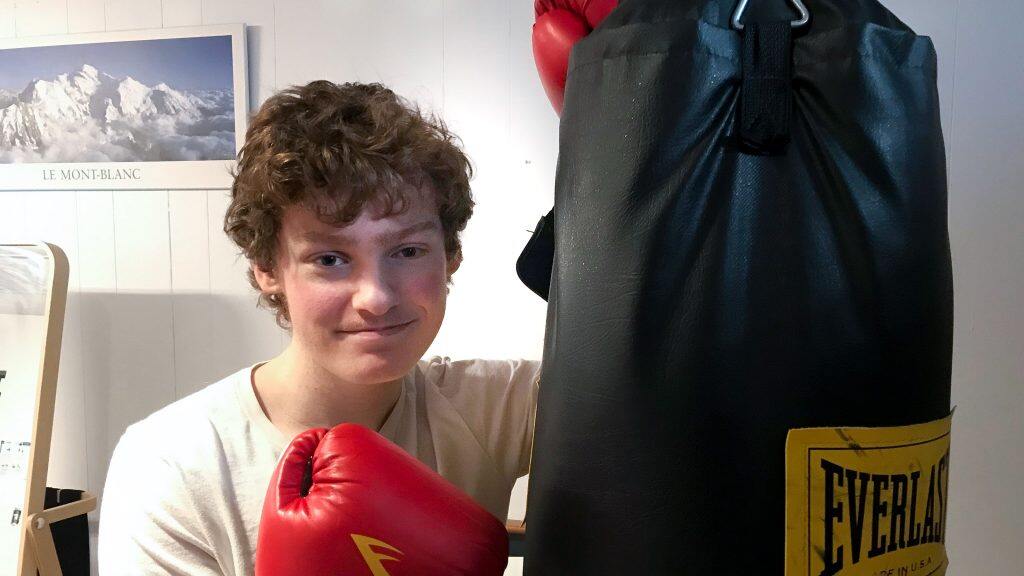

Zacharie Biollo, 16, was born with a ventricle missing in his heart and had three life-saving surgeries by the time he was three years old. As he grew up, his parents encouraged him to get involved in sports such as soccer and karate, but he found he ran out of breath faster than some other kids.
Then he got to participate in a new program to help young heart patients get fit and stay active, developed by the pediatric cardiology group and a team of computing scientists at the University of Alberta.
The children work out at home using a video game-based, high-intensity interval training program on an adapted stationary bicycle called the MedBIKE™, while their vital signs are monitored remotely by a doctor.
Zacharie noticed an improvement after the eight-week cycling program. “My legs got stronger and more used to it,” he said. “My fitness level did increase quite a bit.
“I felt like I could do more and I doubted myself a little less,” said Biollo, who now participates in outdoor cycling, skateboarding and boxing.
The system was first tested on patients like Zacharie who have had a corrective surgery known as the Fontan procedure. The team is now looking to recruit patients aged 10-18 years who have other forms of congenital heart disease or have received heart transplants.
“These patients are expected to survive into adulthood but they have reduced physical activity levels, which has been linked to worse long-term outcomes including mortality and hospitalizations,” said Michael Khoury, assistant professor of pediatrics in the Faculty of Medicine & Dentistry, who leads the program along with computing science professor Pierre Boulanger in the Faculty of Science.
“We know that improved exercise capacity can help prevent or reduce these problems,” Khoury said.
“They forget they have cardiac problems”
Until now, most exercise programs for congenital heart patients have been designed to be carried out in a hospital or a designated facility where they can be medically supervised, Khoury said, but the children’s activity levels tended to drop when they return home. It’s estimated that approximately 30 Fontan surgeries are carried out at the Stollery Children’s Hospital in Edmonton each year from across the Prairie provinces.


“Part of the beauty of the MedBIKE system is that you could potentially have it sent into their homes regardless of where they are—Calgary, Winnipeg or Saskatoon—and we could still supervise their workouts from our site,” Khoury said.
The system is a stationary bicycle linked with a tablet and a video game through a TV. As the patient works through various game levels on the screen, the supervising physician tracks their blood pressure, oxygen levels and heart activity remotely and communicates through the video link. The doctor adjusts the resistance on the bicycle tire from afar. Khoury noted that one of the child’s parents is always present.
Patients in the first MedBIKE pilot had participation rates above 90 per cent, he said, a promising sign for their future fitness.
“It’s the gamification that keeps them wanting to exercise because they enjoy the experience,” said Boulanger, who heads the Advanced Man-Machine Interfaces Laboratory and holds the Cisco Research Chair in Healthcare Solutions. “They forget they have cardiac problems and are just simply having fun.”
“The gamer of the future will have a six-pack,” he joked. “Instead of serious gaming, they will do serious exercise.”
In his research, Boulanger is working to take tele-medicine to the next level beyond video conferencing by using machine learning to remotely detect more heart issues, such as irregular heartbeat.
Khoury is expanding the MedBIKE program to 12 weeks, hiring an exercise physiologist to help run it and enrolling a broader range of pediatric heart patients, thanks to funding from the Heart and Stroke Foundation of Canada and the Stollery Children’s Hospital Foundation through the Women and Children’s Health Research Institute.
Zacharie encourages other pediatric heart patients to give the MedBIKE program a try. He feels lucky to come from a family where fitness is encouraged for all three of the Biollo kids.
“When he was born, we were told to treat him no differently than his siblings,” said his father, Michael Biollo. “We took that statement very seriously.”
When Zacharie was invited to participate in the MedBIKE pilot, the family already knew how important physical activity would be for his longevity and health.
“We felt it was important for him to participate—not just for his own physical well-being, but to pay it forward for everything he’s received as far as health care and treatment,” Michael said.
“It’s important that parents of kids who have this type of condition realize that the only limits you have are the ones that you place on yourself,” said Zacharie’s mother, Anik Biollo. “You have to trust in your child’s capabilities and not be fearful.”


For Zacharie, he will continue to roll with the punches, literally, as he learns more about his current passion, boxing.
“You have to get used to getting punched in the face,” he said. “It’s always a really strange shock, it’s hard to believe when it’s happening, but you’ve got to move past that to keep going.”






































